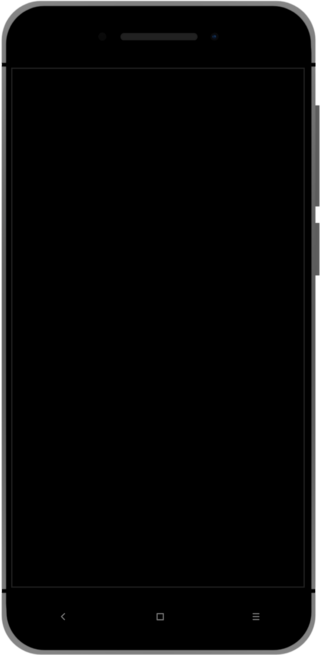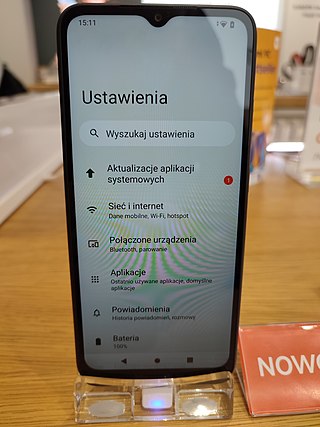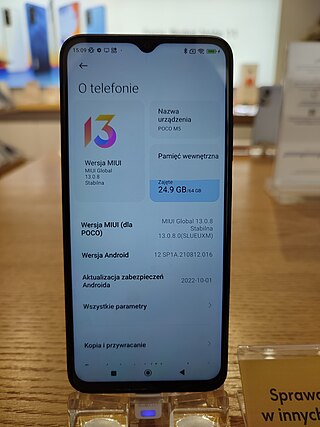
The Xiaomi Redmi 1S, code-named armani HM 1S, is a smartphone released in May 2014, developed by the Chinese company Xiaomi Inc. It is a part of the Redmi series of smartphones, and succeeded the Redmi 1. Visually similar to its predecessor, it comes with a 4.7-inch screen, a quad-core 1.6 GHz Cortex-A7 processor and runs Android version 4.3 (Jellybean), bundled with the proprietary MIUI v5 user interface, which can be upgraded to MIUI v9 based on Android 4.4.4 KTU84P.

The Xiaomi Redmi Note 3 is a smartphone developed by Xiaomi Inc. as part of Xiaomi's low-end Redmi smartphone line. It has three variants:
The Xiaomi Redmi Note Prime is a smartphone released in December 2015 in India, developed by the Chinese company Xiaomi Inc. It is a part of the Redmi Note series of smartphones, and succeeded the Redmi Note 4G. Visually similar to its predecessor, it comes with a 5.5-inch screen, a quad-core 1.2 GHz Qualcomm Snapdragon 410 processor and runs MIUI 7 based on Android 4.4, which can be upgraded to MIUI 9 based on.

The Xiaomi Redmi Note 4 is the fourth smartphone under the Redmi Note series developed by Xiaomi Inc. It is a part of Xiaomi's budget Redmi smartphone lineup. It has two variants : The older version sold as Redmi Note 4 is powered by a Deca-core Mediatek MT6797 Helio X20 SOC. The upgraded version, sold both as Redmi Note 4X and Redmi Note 4 is powered by an Octa-core MSM8953 Qualcomm Snapdragon 625 SoC. The Redmi Note 4 was succeeded by Redmi Note 5.
The Xiaomi Mi A2 is a mid-range smartphone co-developed by Xiaomi and Google as part of Android One program.
The Redmi Note 7series refer to a series of smartphones released by Redmi, a sub-brand of Xiaomi. All have 48 MP + 5 MP camera sensors. Most have a Qualcomm Snapdragon 660 SoC, except the Redmi Note 7 Pro, which has a better Qualcomm Snapdragon 675 SoC. The phones support mobile network frequencies in different regions. The Note 7 is available in many local versions and a global version, compatible with mobile phone providers in most places; the Pro model is supplied in slightly different Chinese and Indian versions. The Redmi Note 7S doesn't have much difference when compared to Redmi Note 7 except in case of the rear camera, hence the production of the Redmi Note 7S was discontinued and came under the Redmi Note 7 in India but it's still available separately in China and other countries.

The Xiaomi Mi A2 Lite is a budget smartphone developed by Xiaomi, a global version of the company's Redmi 6 Pro, co-developed by Google as part of its Android One project.

The Redmi Note 10 is a line of Android-based smartphones as part of the Redmi Note series by Redmi, a sub-brand of Xiaomi Inc. This series were introduced in March 2021 in India and worldwide and May 2021 in China. It succeeds the Redmi Note 9 series of smartphones, which were introduced in 2020.
The Samsung Galaxy M23 5G is an Android-based smartphone designed, developed and marketed by Samsung Electronics. This phone was announced on March 04, 2022.

The Redmi 10 5G is a 5G Android-based smartphone developed by Redmi, a sub-brand of Xiaomi Inc, and was introduced March 29, 2022 alongside the Redmi Note 11S 5G and global version of Redmi Note 11 Pro+ 5G. Earlier in China, the Redmi 10 5G was released alongside Redmi Note 11E Pro as the Redmi Note 11E, and later it was released in India alongside the Redmi 11 Prime and Redmi A1 as the Redmi 11 Prime 5G with different front camera.

The Redmi 10C is an Android-based smartphone as part of the Redmi series, a sub-brand of Xiaomi Inc. The phone was announced on March 21, 2022, and is marketed as a lite version of Redmi 10 being at the same time better in some specifications.
Xiaomi MIX Fold 2 is an Android-based foldable smartphone manufactured by Xiaomi. For the first time in the MIX Fold series, the phone developed in partnership with Leica camera, it was announced on August 11, 2022.

The Redmi A1 and Redmi A1+ are Android-based smartphones designed, marketed and manufactured by Xiaomi sub-brand Redmi. They were announced on September 6, 2022 and they were released on September 9, 2022. The smartphones have a MediaTek Helio A22 processor, Leather Design and 8MP dual camera. Additionally, The Redmi A1+ features a fingerprint sensor.
The Redmi 7 is an Android-based smartphone as part of the Redmi series, a sub-brand of Xiaomi Inc. It was announced on March 18, 2019 and it was released on March 20, 2019.

The Redmi 12 and Redmi 12 5G are Android-based smartphones marketed as part of the Redmi series by a sub-brand of Xiaomi Inc with the same name. The 4G model was announced on June 15, 2023 and the 5G model was announced on August 1, 2023.

The Redmi 12C is an Android-based smartphone as part of the Redmi series, a sub-brand of Xiaomi Inc. with the same name. It was announced on December 31, 2022.

Xiaomi Mi 5s Plus is a flagship smartphone from the Chinese company Xiaomi, which is a modification of the Xiaomi Mi 5. It was presented on September 27, 2016, with Xiaomi Mi 5s. This is the first smartphone of the Mi series to receive a dual main camera setup.

The POCO M5 is a budget Android-based smartphone developed by POCO as a part of the M series, and was introduced on September 5, 2022, alongside the POCO M5s.











